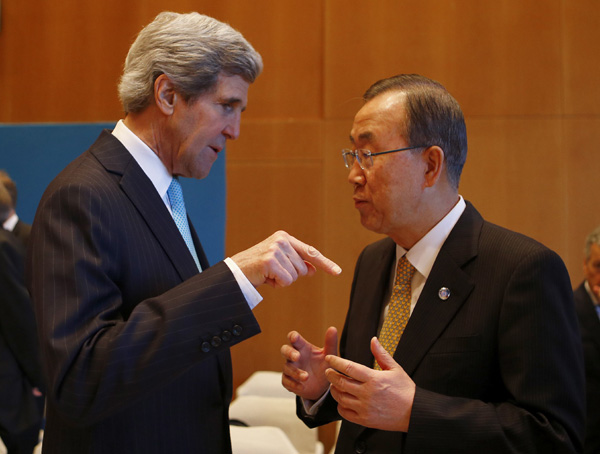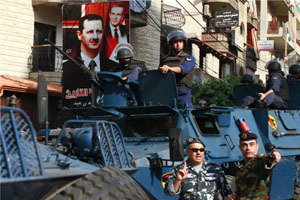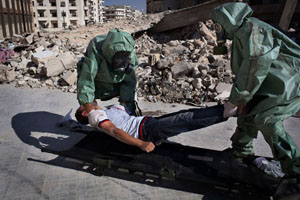 |
|
US Secretary of State John Kerry (L) talks to UN Secretary-General Ban Ki-moon prior to peace talks in Montreux January 22, 2014. [Photo/Agencies] |
MONTREUX, Switzerland - Syria's government and its enemies came face to face on Wednesday for the first time as a peace conference began in Switzerland which world powers hope can at least start a process to end three years of civil war.
There was immediate evidence of sharp differences, as US Secretary of State John Kerry insisted that President Bashar al-Assad must step down, while Russian Foreign Minister Sergei Lavrov cautioned against outsiders meddling in Syria's affairs.
United Nations Secretary-General Ban Ki-moon opened what will be a day of speeches at Montreux on Lake Geneva from more than 40 delegations, including the opposing sides in Syria, by painting a bleak picture of the suffering of millions and of abuses of human rights by all the warring parties.
"Syrians must start talking to each other again," Ban said, urging both sides to reach a comprehensive settlement based on the UN Geneva Communique, under which world powers called in 2012 for a transitional government to oversee change in Syria.
"There is no alternative to ending the violence ... I appeal to all of you to show greater vision for humanity."
Calling the challenges ahead great but not insurmountable, he called for immediate access for aid to areas under siege.
|
More editor's picks: |
 |
 |
Western powers and Russia have sought to set aside their own sharp differences over whether Assad must be forced to make way for an interim administration and have backed the conference as a way to stop the spread of communal and sectarian violence spreading across the region.
The conference, which Ban hopes will be followed by further talks in Geneva, has raised no great expectations, particularly among Islamist rebels on Syria's frontlines who have branded Western-backed opposition leaders as traitors for even agreeing to be in the same room as Assad's delegates.
Underlining the seemingly intractable positions, Syrian Foreign Minister Walid al-Moualem said on Tuesday that Assad's position was non-negotiable. "The subject of the president and the regime is a red line for us and the Syrian people and will not be touched," he was quoted as saying in Syrian media.
IRAN SCEPTICAL
Lavrov, co-sponsor of the conference with Kerry, repeated Moscow's opposition to "outside players" meddling in Syria's affairs but he also said Iran - Assad's main foreign backer - should have a say.
Kerry, in his brief speech to the floor, said negotiations would be "tough and complicated" but insisted there was "no way" Assad could stay on with a transitional government.
"One man can no longer hold an entire nation or region hostage," Kerry said, while also adding there would be no room in government for "terrorists" among the rebel forces.
Assad backer Iran was not present. A last-minute invitation from Ban to attend was revoked on Monday after the Syrian opposition threatened to boycott the talks, since Iran shares Assad's view that he should not lose power.
Iranian President Hasan Rouhani said that made it unlikely the conference could succeed: "Because of the lack of influential players in the meeting, I doubt about the Geneva 2 meeting's success in fighting against terrorism ... and its ability to resolve the Syria crisis," Rouhani said.
"The Geneva 2 meeting has already failed without it even being started," he was quoted as saying by IRNA news agency - though he added he would be pleased if it did help bring peace.
More about Syria peace talks
UN chief : Syria talks face 'formidable' obstacles
China expresses hope for Syria talks
|
|
|
|
|
|
|
|
